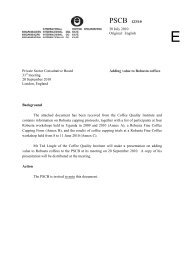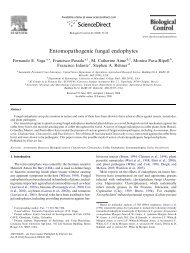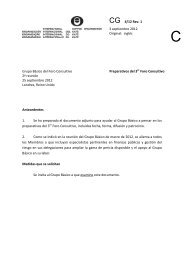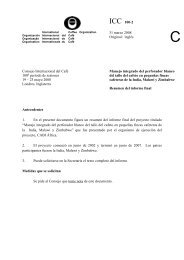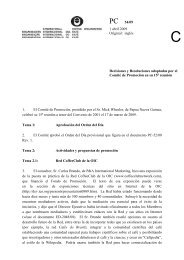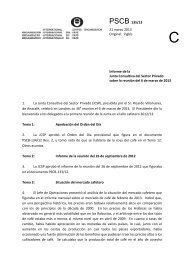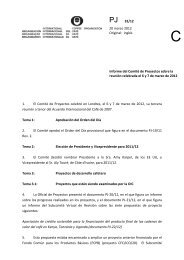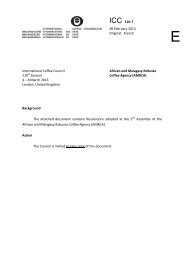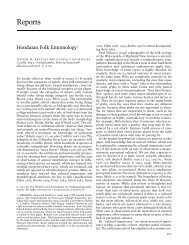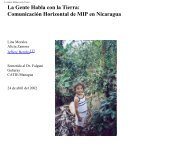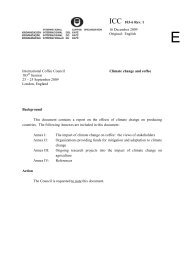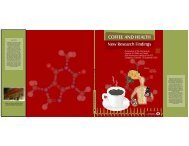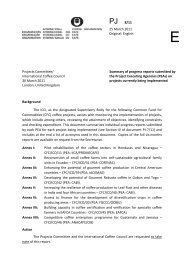Devouring profit - International Coffee Organization
Devouring profit - International Coffee Organization
Devouring profit - International Coffee Organization
Create successful ePaper yourself
Turn your PDF publications into a flip-book with our unique Google optimized e-Paper software.
are not used to making measurements and recording them for future reference and<br />
action. We will return to IPM later.<br />
1.2 Ways to<br />
control CBB<br />
Insecticides: a number of products are employed, though endosulfan is the overwhelming<br />
favourite of farmers and regrettably this is also a highly toxic product to<br />
humans.<br />
Advantages of insecticides: efficient (up to 80% mortality) to kill adult females in<br />
the entry tunnel.<br />
Disadvantages of insecticides: health risk; environmental damage; costly to apply<br />
(up to 5 man-days/ha for a small farmer); not so effective at killing mature infestations;<br />
CBB can develop resistance to insecticides; poor image for coffee exports.<br />
Until recently, it was common for governments, commodity boards and donors to<br />
subsidise pesticide inputs. Now subsidies are out of fashion and NGOs have done a<br />
good job of pointing out the perils of the cheap provision of poisons. The use of<br />
chemicals is becoming increasingly unacceptable in modern coffee production and in<br />
the case of CBB, the two most effective pesticides, endosulfan and chlorpyrifos, are<br />
also two of the most dangerous to apply. At the policy level, the argument for sustainable<br />
agriculture has been won, the chemical approach is no longer acceptable, as is<br />
now confirmed by the approaching EU-wide ban on many of these substances. But no<br />
one has told the farmers and simple alternatives are not easy to come by.<br />
Biological control (parasitoid wasps): there are four principal wasps, Cephalonomia<br />
stephanoderis, Prorops nasuta, Heterospilus coffeicola, and Phymastichus coffea. The<br />
first two have been studied extensively and released in many countries; although they<br />
establish readily in most regions, the control they exert is small and even when released<br />
in large numbers their control effect has been disappointing. H. coffeicola has<br />
been studied in the field and seems promising, but as yet rearing it has proved too<br />
difficult to allow it to be quarantined and shipped to other countries. P. coffea on the<br />
other hand can now be reared successfully and preliminary experiments suggest it is<br />
more effective than the previously tried wasps.<br />
Advantages of wasps: environmentally clean; no health risk; easy to use.<br />
Disadvantages of wasps: still too expensive for commercial augmentative release,<br />
though this may change in the short to mid-term.<br />
Biological control (pathogens): Beauveria bassiana (Bb) is the most studied and fieldtested.<br />
Lifetable studies in Colombia suggest that Bb is the major natural biotic mortal-<br />
15



